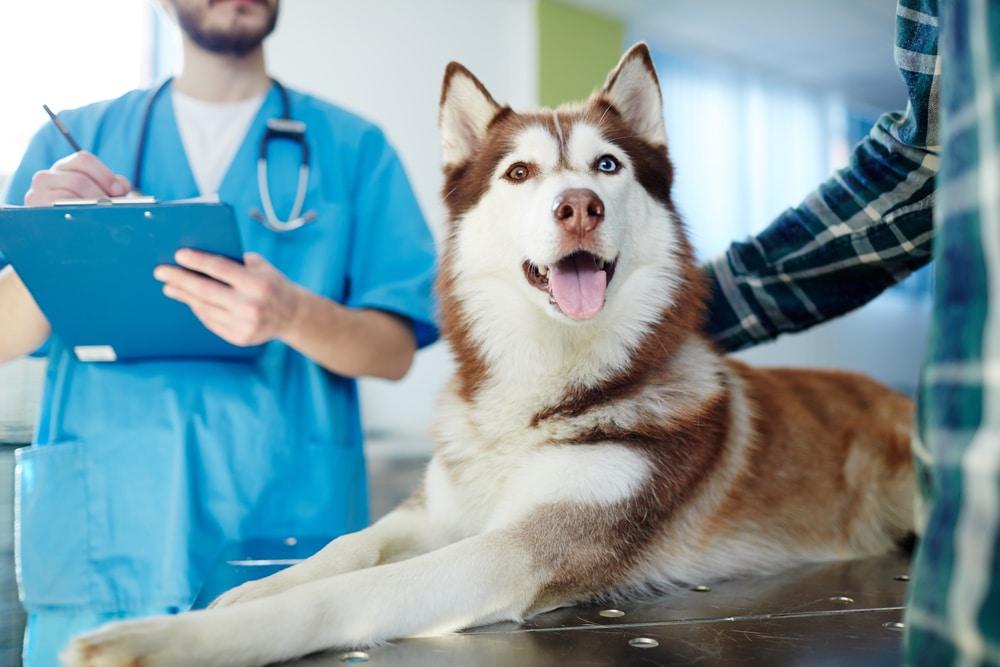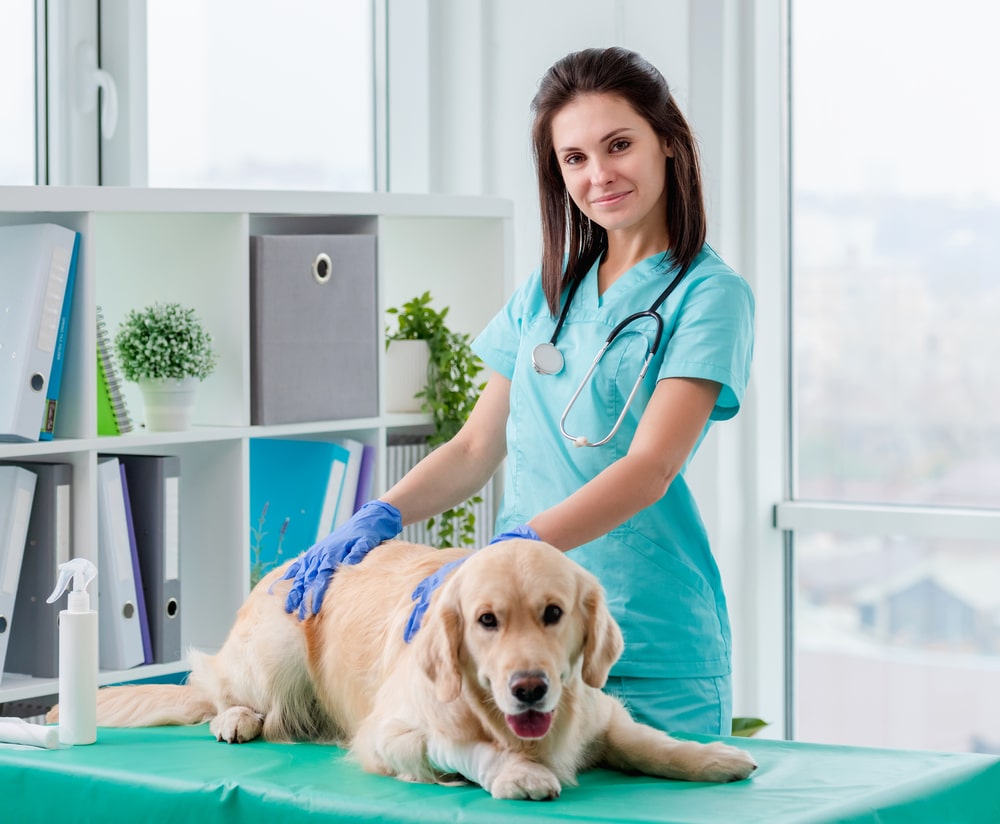If you have a furry family member, you probably know your vet’s job is to help your dog feel better when they are sick or injured and to keep them healthy through annual wellness checks and preventative care. But what services do vets provide for dogs? The list is endless, so let’s examine some of the most common ones.
Vets provide all manner of services to their dogs! This includes wellness care (annual exams, vaccines, flea/heartworm/intestinal parasite prevention), sick pet visits for minor injuries or illnesses (such as vomiting, diarrhea, limping, skin/ear infections, etc.), working with pets who have severe or chronic illness (such as kidney disease, diabetes, cancer, etc.), performing surgeries and dental work, and offering end-of-life services including hospice care and euthanasia. Veterinarians learn how to treat many different species during vet school. They also learn about all the different body systems. While there are veterinary specialists just like in human medicine, most general practitioners can also be dentists, surgeons, cardiologists, oncologists, and more for their patients! Your vet’s goal is to keep your pet happy and healthy. They will be there to help you manage any questions or concerns about your furry family member’s health.
Table of Contents
Wellness And Preventative Care

Even if your pet is healthy and doing well at home, it is still critical to take them to the vet at least once a year for wellness care. This is how your vet can help keep them healthy and disease/parasite free. It’s also how they catch any issues early when they may be easier to treat.
Your vet will gather information from you about diet and routine, as well as any medications or supplements you are giving your dog. If you have any questions or concerns about your dog’s health or behavior, this is the time to bring them up!
Annual Exam
An annual exam is a nose-to-tail exam of all body systems to help evaluate your fur baby’s overall health. Your vet will also record and keep track of your dog’s weight, temperature, heart rate, and respiratory rate. This is an example of a typical canine physical exam.
Vaccines
Core vaccines (recommended for all animals) for dogs include Rabies and a Parvovirus, Distemper Virus, and Adenovirus-2 (plus or minus Parainfluenza) combo vaccine. Other (non-core) vaccines can be just as important. They will be recommended based on your pet’s age, lifestyle, and risk of exposure. Vets generally give vaccines every year or every three years.
Flea/Parasite/Heartworm Prevention
Year-round flea, heartworm, and intestinal parasite prevention are beneficial for all animals. If your pet has a flea allergy, goes outdoors frequently, or lives with young children or immunocompromised individuals, this is especially critical. There are many different brands and preparations of parasite prevention. There are oral products, topical products, injectible products, and products that protect against one type or many types of external and internal parasites. With all these options, it can be overwhelming to pick a product for your pet. Your vet will have a recommendation based on your pet’s breed and lifestyle.
Screening Bloodwork
Once a pet reaches around seven years of age and is classified as a senior, your vet may begin recommending yearly screening bloodwork. This will help evaluate their overall systemic health, catch any potential issues early, and also provide a baseline to compare with in the future. If your dog is taking any long-term medications it is also important to check bloodwork and make sure their major organs are continuing to function well.
Weight
Based on a study in 2019 of adult dogs seen at Banfield pet hospitals, over 50% were considered overweight or obese. Just like in people, overweight pets are more at risk for developing certain diseases affecting the quality and length of their life. This may include a higher risk of developing cancer, diabetes, heart disease, arthritis, bladder stones, and complications under anesthesia. Many pet parents may not know their pet is overweight or the best ways to help them lose excess weight. So, this is important to discuss every year with your vet.
Sickness And Injury
Per the American Veterinary Medical Association, the conditions below are some of the most common reasons for sick dog vet visits.
Skin And Ear Infections
Skin and ear infections are extremely common in dogs and are often due to underlying allergies. Dogs can be allergic to fleas, something in their diet (food allergy), or something in the environment (atopy). Your vet may recommend testing to determine an underlying cause such as allergy or external parasites, skin cytology or culture to determine the type of bacteria or yeast causing the infection, and/or prescribe topical or oral medications to treat the infection.
Vomiting and Diarrhea
Gastrointestinal upset may be due to numerous things. Some are relatively mild and easy to treat such as dietary indiscretion (eating something they shouldn’t have) or intestinal parasites. Other times this can be due to something much more severe or even life-threatening. These are things such as systemic disease (kidney disease, liver disease, cancer, etc.), inflammatory bowel disease, pancreatitis, or intestinal obstruction (when something becomes stuck in the intestines, causing a blockage). Therefore, there is also a wide range of treatment options. These range from anti-nausea medications and bland diets to antibiotics to surgery.
Urinary Issues
Urinary tract infection, cystitis (inflammation of the bladder), bladder stones, incontinence, and bladder tumors, are all possible causes of urinary issues. There are also several diseases, such as kidney disease, diabetes, and Cushing’s Disease that cause increased thirst and urination (polyuria/polydipsia) as a symptom. To work up and treat urinary disease your vet may recommend bloodwork, urinalysis, urine culture, and imaging such as x-rays or ultrasound to further evaluate the bladder.
Arthritis And Limping
This is common in older dogs. Many benefit from a thorough physical exam, x-rays to pinpoint the issue, and then management with joint supplements, NSAIDs, and other pain medications. Other types of injuries such as intervertebral disc disease or cranial cruciate ligament injury may require more extensive treatments or surgery with a specialist.
Surgery
This is not a word pet owners want to hear, but it is necessary to perform in some cases. Here’s what they are.
Spay and Neuter
A spay, also known as an ovariohysterectomy, is a surgery to remove the uterus and ovaries in a female dog to prevent her from having puppies. Sometimes, only the ovaries are removed (known as an ovariectomy). A neuter surgery, or castration, involves removing a male’s testicles so he cannot get a female pregnant.
Both of these surgeries can be performed by your vet, usually when your pet is around six months of age. While no surgery is without risk, these are extremely common and safe procedures. They are also recommended for all animals who will not be bred, to help increase their life expectancy and reduce the risk of certain disease processes.
Mass Removal
Skin lumps and bumps are extremely common in dogs. These may be benign or malignant (cancerous). Mass removal is advised if a mass is malignant or if it is affecting your dog’s mobility or is bothering them due to bleeding or infection. Small masses can sometimes be removed under sedation and local blocks, but most require general anesthesia. Afterward, the mass is often submitted for further evaluation.
Dental Cleaning And Extractions
Your pet’s dental health is an important aspect of their veterinary care. Dental disease can occur at any age but is especially common in adult and senior pets. The majority of pets will need multiple dental cleaning under anesthesia with your vet throughout their life. This generally involves anesthesia, a thorough oral exam and probing of the teeth, dental x-rays, and extraction of any diseased or damaged teeth. Your vet will be happy to discuss when this may be recommended for your pet, what it entails, and a cost estimate.
Other
There are many additional services vets provide. These are some of them.
Euthanasia
This is unique to the veterinary field. Vets have the ability to end their patients suffering and help them leave this world in a kind and dignified way. Euthanasia is undoubtedly a difficult part of the job (and for a pet parent too). While of course, it is difficult for a vet to say goodbye to the patients they have come to know, the saddest part of euthanasia is helping their owners navigate this loss. Your veterinarian will not euthanize a pet unless they feel it is the best and kindest course of action. They will also be there for you every step of the way whether or not you choose to be present.
Client Education
Client communication and education is a critical part of a vet’s job. If a vet is unable to clearly and empathetically explain a pet’s condition and treatment recommendations, the owner may not consent to the care that is needed. Many vets make use of handouts and online resources to help educate clients.
One Health
One Health encompasses the idea that all medical fields are interrelated and connected between species and across the globe. Veterinarians working in public health, the food industry, the pharmaceutical industry, and studying zoonotic diseases (diseases that can be spread from animals to people) are key players in this.
Conclusion: What Services Do Vets Provide For Dogs?
Vets provide all sorts of services to dogs, and they wear lots of hats too. They must be excellent communicators, skilled doctors, and above all animal lovers. If you have any questions or concerns about your canine family member, your vet is the best resource due to the numerous services that vets provide. If they are not able to help, they will be able to refer you to someone who can.
So, did anything on our list surprise you? What was most helpful to learn about? Let us know in the comments below!
